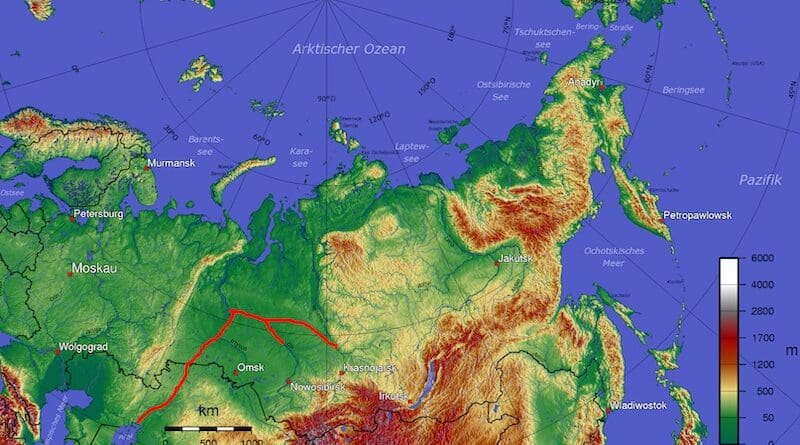
The layout of one of the past main proposed water transfer routes (via a Yenisei–Ob canal, down the Ob, up the Irtysh and Ishim, and then via a canal to the Aral Sea basin). The plan would involve other canals (not shown) to take the water further south.
Credit: Wikipedia Commons
February 28, 2025
By Paul Goble
For more than a century, Russians have talked about the possibility of diverting water from Siberia’s rivers to Central Asia to save the Aral Sea and help Central Asia overcome its water shortages; but these plans have been shot down in Moscow not only because they cost so much but also because they harmed Russia in various other ways.
But now two Moscow experts on hydrology argue that three developments have changed the situation and that as a result Russia would benefit far more than Central Asia. As a result, there is now a far better chance that the Russian government will back Siberian river diversion (ng.ru/nauka/2025-02-25/9_9200_system.html).
According to Mikhail Zelikhanov and Stanislav Stepanov of the Russian Academy Sciences, the three developments that have shifted the balance in favor of going ahead with this project are the following:First, global warming has increased the amount of water in Siberian rivers to the point that they flood Russian cities on a regular basis. The costs of repairing such disasters are so large than they make the costs of Siberian river diversion seem relatively small.
Second, Russian technology has advanced to the point that any water shifted from Siberia to Central Asia could go through pipelines rather than via canals, thus limiting the amount lost by filtration and evaporation to the point that the costs of the project are much reduced.
And third, in the wake of the redivision of the world following Putin’s expanded attack on Ukraine and the ensuing Western sanctions means that Moscow would benefit by creating a network of pipelines to carry water to Central Asia, China and other countries, not only financially but in terms of influence and getting investment from them.
These arguments are likely to be far more compelling that those advocates of this project have made in the past, although it is certain that many ecological activists and budget hawks will continue to oppose the measure. And in any case, its construction would take at a minimum several years.
But the appearance of the article by Zelikhanov and Stepanov is a reminder that the idea of Sbierian River Diversion is anything but dead, despite the veto the Gorbachev government imposed on it more than three decades ago. (For background on support for it since that time, see windowoneurasia2.blogspot.com/2024/07/only-revival-of-siberian-river.html.)

Paul Goble is a longtime specialist on ethnic and religious questions in Eurasia. Most recently, he was director of research and publications at the Azerbaijan Diplomatic Academy. Earlier, he served as vice dean for the social sciences and humanities at Audentes University in Tallinn and a senior research associate at the EuroCollege of the University of Tartu in Estonia. He has served in various capacities in the U.S. State Department, the Central Intelligence Agency and the International Broadcasting Bureau as well as at the Voice of America and Radio Free Europe/Radio Liberty and at the Carnegie Endowment for International Peace. Mr. Goble maintains the Window on Eurasia blog and can be contacted directly at paul.goble@gmail.com .
February 28, 2025
By Paul Goble
For more than a century, Russians have talked about the possibility of diverting water from Siberia’s rivers to Central Asia to save the Aral Sea and help Central Asia overcome its water shortages; but these plans have been shot down in Moscow not only because they cost so much but also because they harmed Russia in various other ways.
But now two Moscow experts on hydrology argue that three developments have changed the situation and that as a result Russia would benefit far more than Central Asia. As a result, there is now a far better chance that the Russian government will back Siberian river diversion (ng.ru/nauka/2025-02-25/9_9200_system.html).
According to Mikhail Zelikhanov and Stanislav Stepanov of the Russian Academy Sciences, the three developments that have shifted the balance in favor of going ahead with this project are the following:First, global warming has increased the amount of water in Siberian rivers to the point that they flood Russian cities on a regular basis. The costs of repairing such disasters are so large than they make the costs of Siberian river diversion seem relatively small.
Second, Russian technology has advanced to the point that any water shifted from Siberia to Central Asia could go through pipelines rather than via canals, thus limiting the amount lost by filtration and evaporation to the point that the costs of the project are much reduced.
And third, in the wake of the redivision of the world following Putin’s expanded attack on Ukraine and the ensuing Western sanctions means that Moscow would benefit by creating a network of pipelines to carry water to Central Asia, China and other countries, not only financially but in terms of influence and getting investment from them.
These arguments are likely to be far more compelling that those advocates of this project have made in the past, although it is certain that many ecological activists and budget hawks will continue to oppose the measure. And in any case, its construction would take at a minimum several years.
But the appearance of the article by Zelikhanov and Stepanov is a reminder that the idea of Sbierian River Diversion is anything but dead, despite the veto the Gorbachev government imposed on it more than three decades ago. (For background on support for it since that time, see windowoneurasia2.blogspot.com/2024/07/only-revival-of-siberian-river.html.)

Paul Goble is a longtime specialist on ethnic and religious questions in Eurasia. Most recently, he was director of research and publications at the Azerbaijan Diplomatic Academy. Earlier, he served as vice dean for the social sciences and humanities at Audentes University in Tallinn and a senior research associate at the EuroCollege of the University of Tartu in Estonia. He has served in various capacities in the U.S. State Department, the Central Intelligence Agency and the International Broadcasting Bureau as well as at the Voice of America and Radio Free Europe/Radio Liberty and at the Carnegie Endowment for International Peace. Mr. Goble maintains the Window on Eurasia blog and can be contacted directly at paul.goble@gmail.com .
No comments:
Post a Comment